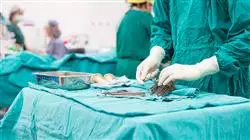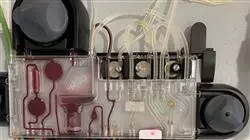University certificate
The world's largest faculty of medicine”
Introduction to the Program
The current importance of Infectious Pathologies makes this Postgraduate certificate a safe bet for specialization in an increasingly demanding healthcare context"

Individuals suffering from multiple chronic diseases associated with infections often undergo complicated surgical procedures. During these procedures, patients with weakened immune systems can contract pathogens in their incisions that greatly hinder their recovery. Under these circumstances, specialists must follow a series of key steps to identify the type of bacteria or virus involved and its susceptibility to antibiotics. Also, it is essential that physicians remain attentive to signs of infection, which can range from redness to fever or secretions. They can then administer the most appropriate treatments to ensure that the lesions heal properly.
In this context, TECH has implemented a pioneering program for physicians who aspire to integrate multidisciplinary treatments into their daily clinical practice. In this way, the curriculum includes both the etiology of infections and their microbiological diagnosis. On the other hand, the syllabus covers guidelines for the management of joint prosthesis contamination. Also, the didactic materials delve into various intra-abdominal infections, among which cholecystitis and diverticulitis stand out. In this way, physicians acquire advanced skills to diagnose specific pathogens and implement the most appropriate therapies to ensure the well-being of patients. It should be noted that, throughout the agenda, innovation is encouraged to develop new lines of research to improve the care of complex chronic patients.
On the other hand, to reinforce all these contents, the methodology of this program reinforces its innovative character. TECH offers a 100% online teaching environment, adapted to the needs of busy professionals seeking to advance their careers. In addition, it will employ the Relearning methodology, based on the repetition of key concepts to fix knowledge and facilitate learning. In this way, the combination of flexibility and a robust pedagogical approach.
You will effectively manage the Diabetic Foot to prevent infections, thus avoiding damage to nerves and blood vessels after this university program"
This Postgraduate certificate in Infectious Pathology in the Complex Chronic Patient contains the most complete and up-to-date scientific program on the market. The most important features include:
- The development of case studies presented by experts in Complex Chronic Patients
- The graphic, schematic, and practical contents with which they are created, provide scientific and practical information on the disciplines that are essential for professional practice
- Practical exercises where self-assessment can be used to improve learning
- Its special emphasis on innovative methodologies
- Theoretical lessons, questions to the expert, debate forums on controversial topics, and individual reflection assignments
- Content that is accessible from any fixed or portable device with an Internet connection
The Relearning method applied by TECH in its programs reduces the long hours of study so common in other teaching systems. Don't miss the opportunity"
The Relearning method applied by TECH in its programs reduces the long hours of study so common in other teaching systems. Don't miss the opportunity"
The program’s teaching staff includes professionals from the field who contribute their work experience to this educational program, as well as renowned specialists from leading societies and prestigious universities.
The multimedia content, developed with the latest educational technology, will provide the professional with situated and contextual learning, i.e., a simulated environment that will provide immersive education programmed to learn in real situations.
This program is designed around Problem-Based Learning, whereby the professional must try to solve the different professional practice situations that arise during the academic year For this purpose, the students will be assisted by an innovative interactive video system created by renowned and experienced experts.
By completing this academic pathway, you will be able to design individualized prevention plans that will improve the quality of life of your patients"

Do you want to specialize in the vaccination of complex chronic patients? Achieve it with this 6-week program"
Why study at TECH?
TECH is the world’s largest online university. With an impressive catalog of more than 14,000 university programs available in 11 languages, it is positioned as a leader in employability, with a 99% job placement rate. In addition, it relies on an enormous faculty of more than 6,000 professors of the highest international renown.

Study at the world's largest online university and guarantee your professional success. The future starts at TECH”
The world’s best online university according to FORBES
The prestigious Forbes magazine, specialized in business and finance, has highlighted TECH as “the world's best online university” This is what they have recently stated in an article in their digital edition in which they echo the success story of this institution, “thanks to the academic offer it provides, the selection of its teaching staff, and an innovative learning method aimed at educating the professionals of the future”
A revolutionary study method, a cutting-edge faculty and a practical focus: the key to TECH's success.
The most complete study plans on the university scene
TECH offers the most complete study plans on the university scene, with syllabuses that cover fundamental concepts and, at the same time, the main scientific advances in their specific scientific areas. In addition, these programs are continuously being updated to guarantee students the academic vanguard and the most in-demand professional skills. In this way, the university's qualifications provide its graduates with a significant advantage to propel their careers to success.
TECH offers the most comprehensive and intensive study plans on the current university scene.
A world-class teaching staff
TECH's teaching staff is made up of more than 6,000 professors with the highest international recognition. Professors, researchers and top executives of multinational companies, including Isaiah Covington, performance coach of the Boston Celtics; Magda Romanska, principal investigator at Harvard MetaLAB; Ignacio Wistumba, chairman of the department of translational molecular pathology at MD Anderson Cancer Center; and D.W. Pine, creative director of TIME magazine, among others.
Internationally renowned experts, specialized in different branches of Health, Technology, Communication and Business, form part of the TECH faculty.
A unique learning method
TECH is the first university to use Relearning in all its programs. It is the best online learning methodology, accredited with international teaching quality certifications, provided by prestigious educational agencies. In addition, this disruptive educational model is complemented with the “Case Method”, thereby setting up a unique online teaching strategy. Innovative teaching resources are also implemented, including detailed videos, infographics and interactive summaries.
TECH combines Relearning and the Case Method in all its university programs to guarantee excellent theoretical and practical learning, studying whenever and wherever you want.
The world's largest online university
TECH is the world’s largest online university. We are the largest educational institution, with the best and widest online educational catalog, one hundred percent online and covering the vast majority of areas of knowledge. We offer a large selection of our own degrees and accredited online undergraduate and postgraduate degrees. In total, more than 14,000 university degrees, in eleven different languages, make us the largest educational largest in the world.
TECH has the world's most extensive catalog of academic and official programs, available in more than 11 languages.
Google Premier Partner
The American technology giant has awarded TECH the Google Google Premier Partner badge. This award, which is only available to 3% of the world's companies, highlights the efficient, flexible and tailored experience that this university provides to students. The recognition as a Google Premier Partner not only accredits the maximum rigor, performance and investment in TECH's digital infrastructures, but also places this university as one of the world's leading technology companies.
Google has positioned TECH in the top 3% of the world's most important technology companies by awarding it its Google Premier Partner badge.
The official online university of the NBA
TECH is the official online university of the NBA. Thanks to our agreement with the biggest league in basketball, we offer our students exclusive university programs, as well as a wide variety of educational resources focused on the business of the league and other areas of the sports industry. Each program is made up of a uniquely designed syllabus and features exceptional guest hosts: professionals with a distinguished sports background who will offer their expertise on the most relevant topics.
TECH has been selected by the NBA, the world's top basketball league, as its official online university.
The top-rated university by its students
Students have positioned TECH as the world's top-rated university on the main review websites, with a highest rating of 4.9 out of 5, obtained from more than 1,000 reviews. These results consolidate TECH as the benchmark university institution at an international level, reflecting the excellence and positive impact of its educational model.” reflecting the excellence and positive impact of its educational model.”
TECH is the world’s top-rated university by its students.
Leaders in employability
TECH has managed to become the leading university in employability. 99% of its students obtain jobs in the academic field they have studied, within one year of completing any of the university's programs. A similar number achieve immediate career enhancement. All this thanks to a study methodology that bases its effectiveness on the acquisition of practical skills, which are absolutely necessary for professional development.
99% of TECH graduates find a job within a year of completing their studies.
Postgraduate Certificate in Infectious Pathology in the Complex Chronic Patient
Discover the fascinating world of medicine with our innovative Postgraduate Certificate in Infectious Pathology in the Complex Chronic Patient, offered by TECH Global University. This program is designed for healthcare professionals looking to acquire specialized knowledge in the diagnosis and treatment of infectious diseases in chronic patients, and best of all, you can achieve it through our online classes. As academic leaders in the industry, we understand the importance of flexibility in higher education. Our focus on virtual classes allows you to access high-quality educational content from anywhere, accommodating your busy schedule and allowing you to advance your career without sacrificing your professional responsibilities. We provide you with access to renowned faculty and state-of-the-art resources. By participating in this Postgraduate Certificate, you will be immersed in an educational program that comprehensively addresses the complexities of infectious diseases in chronically ill patients.
Become a specialist in infectious pathology with the best online university
This course focuses on a thorough understanding of infectious pathologies and the comprehensive management of chronically affected patients. You will learn how to effectively diagnose and treat a variety of infectious conditions, considering the complexity of long-term health and improving the quality of life of your patients. Upon successful completion of the Postgraduate Certificate in Infectious Pathology, you will not only earn a certificate backed by the world's best online university, according to Forbes, but you will also be prepared to excel in your medical practice and make a significant contribution to the health of patients with chronic infectious diseases. Take the next step in your medical career and specialize in Infectious Pathology with TECH Global University! Discover a new dimension in your professional development and make a difference in the lives of your patients.







